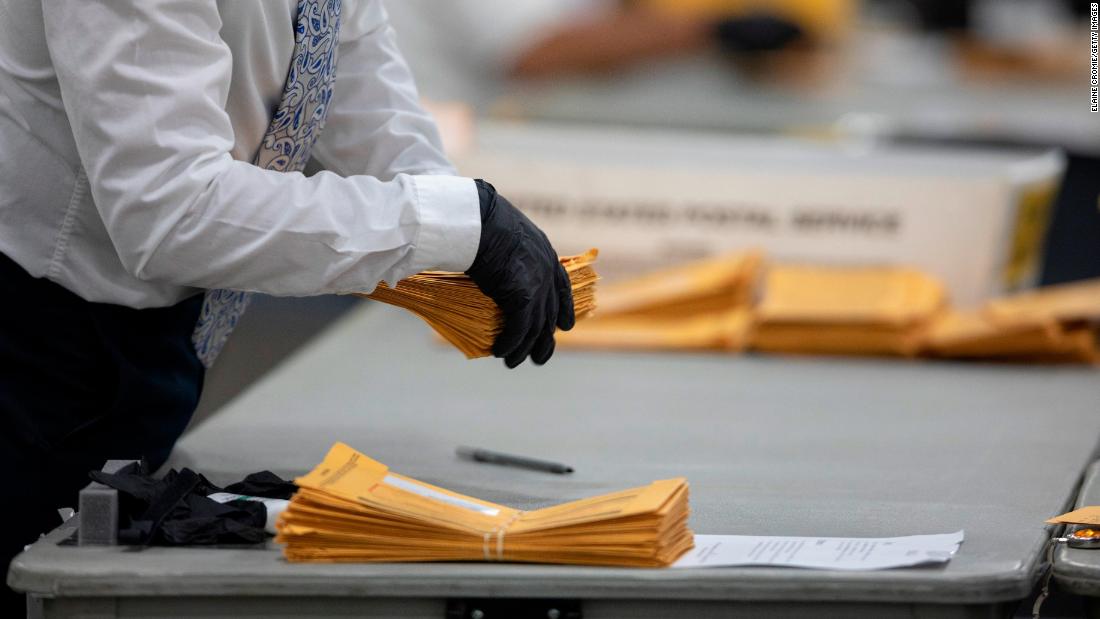Analysis: Trump push to fight election uses courts in attempt to legitimize unfounded claims
“If it’s purely a question of who’s louder, the campaign — with a casual relationship with the truth — can take advantage of the mechanics of judicial proceedings to spin a narrative of how the proceedings are going,” said Steve Vladeck, a CNN legal analyst and law professor. “But only for so long.”
Take the campaign’s approach in Philadelphia late last week. On Election Day, the Trump campaign lost on a request to allow its poll watchers to stand close enough to see the writing on ballots. By Friday it had appealed to a state judge in Philadelphia, who said canvass observers should be able to stand within 6 feet of ballot processing, a ruling that gave the campaign just enough to say it had notched a major win over the vote count.
On Monday, the Pennsylvania Supreme Court, to which the city had appealed Trump’s “win,” said it would not stop the vote counting but would look at questions of state law in the case. Not a vote that’s been counted was changed or thrown out, nor could it be, through the lawsuit.
The Philadelphia case and others have allowed campaign spokespeople to continue to threaten that their filings could bear fruit. There’s always an appeal.
On Monday night, the Trump campaign brought a new lawsuit in federal court that seeks to stop the Pennsylvania secretary of state from certifying Biden’s win and the 20 electoral votes he’s set to receive there. Experts say the newest case is very unlikely to succeed, especially because it seeks to invalidate millions of votes cast in good faith in Pennsylvania.
“This is the sort of desperation, throw the kitchen sink at the wall and see what sticks strategy,” said Ben Ginsberg, a longtime Republican elections lawyer who’s a CNN analyst.
The new case, he said, appears to take a novel approach to contest Biden’s win — as “an attempt to bollox up the certification of results so there’s no winner declared, and that lets the Pennsylvania Legislature name the slate of electors,” Ginsberg said. He noted that if the complaint doesn’t fly in the trial court or federal court of appeals above it, the Trump campaign may try to push it to the newly conservative-strengthened US Supreme Court.
The Pennsylvania case still hangs at the Supreme Court now, making it possible that the state won’t ever count its 10,000 or so mail-in ballots that arrived after Election Day. Those ballots have been kept separate from the totals the state is reporting, making them apparently negligible to Biden’s win in the state.
Fanning allegations of fraud
A state court judge in Michigan took up one of the ballot processing accusations quickly last week. She determined that the sworn statement from the supposed witness was hearsay and therefore couldn’t be taken seriously in court.
“We’ve got an affidavit that is not firsthand knowledge!” Judge Cynthia Stephens exclaimed at a hearing before dismissing a Republican poll challenger’s accusation about a conversation that another election worker allegedly had overheard.
The conversation around unproven voting irregularities has led to careful responses from some Republicans that have allowed Trump’s accusations to remain viable. Many are still walking the line between supporting Trump’s groundless claims and urging the need to find solid evidence for contesting the election.
The legal community appeared to take heart in the possibility that judges could act swiftly to determine the truth and counter overblown claims.
“When the Trump campaign says we have all this evidence of voter fraud, the court of public opinion is ill suited to measure that evidence. A court of record is actually perfectly suited to measure that evidence,” Vladeck said, calling judges the “deflators of conspiracy balloons.”
But the actions of even the most skeptical judge can have a limited impression.
Fix the Court, which has long advocated for cameras in the courtroom, said on Monday that it believed more public access to court could help counter the online disinformation.
The group, along with five major journalism advocacy groups, wrote to the administrative office of US courts on Election Day to ask for live conference lines or video streaming of hearings in election-related cases.
“The absence of live broadcast access to election-related court proceedings plays into the false narrative that something suspicious is afoot,” said Fix the Court’s executive director, Gabe Roth. “Instead of implementing policies like livestreaming that would bolster faith in our institutions during a tumultuous time, a broadcast- and modernity-averse judiciary is undermining its own work.”
For now, word of court developments comes in filing by filing.
The federal judiciary replied to Fix the Court’s request that it would respond shortly. But there’s been no decision yet.
CNN’s Jessica Schneider, Evan Perez and Alex Marquardt contributed to this report.
![]()


